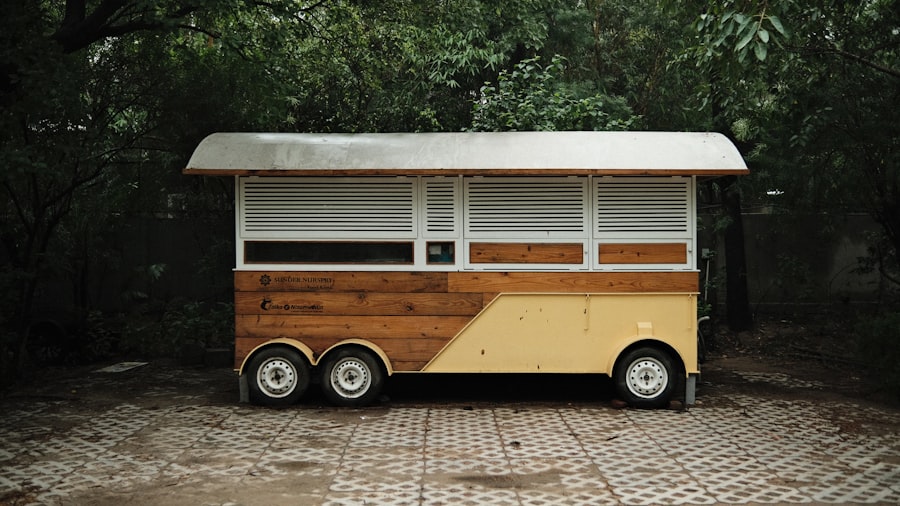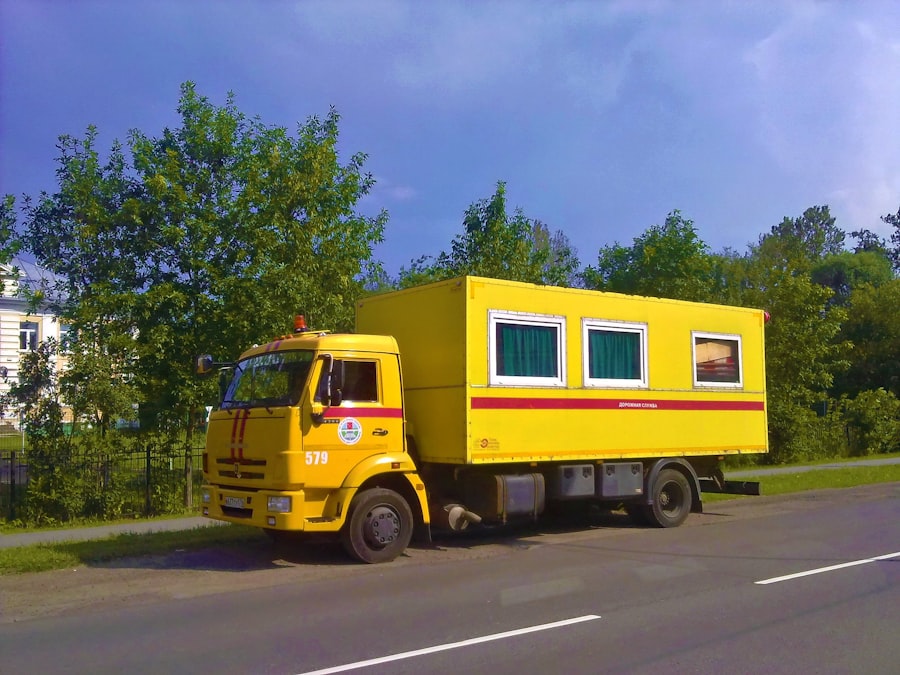Mobile home trailers, often referred to as manufactured homes, have evolved significantly since their inception in the mid-20th century. Originally designed as a more affordable housing option, these homes have transformed into a viable alternative to traditional site-built houses. The modern mobile home is constructed in a factory setting and transported to its final location, offering a unique blend of convenience and affordability.
With advancements in design and construction techniques, today’s mobile homes can rival conventional homes in terms of aesthetics, functionality, and comfort. The appeal of mobile home trailers extends beyond mere affordability; they represent a lifestyle choice that emphasizes flexibility and community. As more individuals and families seek alternatives to the high costs associated with traditional homeownership, mobile homes have gained popularity across various demographics.
From retirees looking to downsize to young families seeking their first home, the versatility of mobile homes caters to a wide range of needs and preferences. This article delves into the multifaceted advantages of mobile home living, exploring aspects such as cost-effectiveness, mobility, community dynamics, and environmental benefits.
Key Takeaways
- Mobile home trailers offer an affordable and flexible housing option.
- They provide cost-effective living with lower expenses compared to traditional homes.
- Mobility allows residents to relocate easily, enhancing lifestyle flexibility.
- Many mobile home communities foster a strong sense of neighborhood and shared amenities.
- Upgrades and eco-friendly features can improve comfort and reduce environmental impact.
Cost-Effective Living
One of the most compelling reasons individuals and families opt for mobile home trailers is the significant cost savings associated with this housing choice. The initial purchase price of a mobile home is typically much lower than that of a traditional house, making it an attractive option for first-time buyers or those on a fixed income. According to the U.S. Census Bureau, the average price of a new manufactured home is considerably less than that of a new single-family site-built home, often by tens of thousands of dollars. This affordability allows buyers to allocate their financial resources toward other essential areas, such as education, retirement savings, or travel. In addition to lower purchase prices, mobile homes often come with reduced ongoing costs. Property taxes for mobile homes are generally lower than those for traditional homes, which can lead to substantial savings over time. Furthermore, many mobile home parks offer amenities and services that can help reduce living expenses, such as maintenance and landscaping. The energy efficiency of modern mobile homes also contributes to cost-effective living; many are built with advanced insulation and energy-efficient appliances that lower utility bills. This combination of lower upfront costs and ongoing savings makes mobile home living an appealing option for those looking to stretch their budgets further.
Flexibility and Mobility

The inherent design of mobile home trailers provides a level of flexibility that traditional homes simply cannot match. For individuals who value mobility or have jobs that require frequent relocation, mobile homes offer an ideal solution. Unlike conventional houses that are fixed in place, mobile homes can be transported from one location to another with relative ease.
This feature is particularly advantageous for those who may need to move for work or personal reasons, allowing them to take their home with them rather than starting anew. Moreover, the flexibility of mobile home living extends beyond physical mobility. Many mobile home parks offer a variety of leasing options, allowing residents to choose between long-term leases or shorter arrangements based on their needs.
This adaptability can be especially beneficial for young professionals or families who may not yet be ready to commit to a permanent residence. Additionally, the ability to customize or upgrade mobile homes means that residents can tailor their living spaces to suit their evolving lifestyles without the constraints often associated with traditional homeownership.
Community Living
| Metric | Description | Value | Unit |
|---|---|---|---|
| Number of Community Living Residents | Total individuals living in community-based settings | 1,250 | People |
| Average Length of Stay | Average duration residents have lived in community settings | 4.5 | Years |
| Employment Rate | Percentage of residents employed in the community | 65 | % |
| Community Participation Rate | Percentage of residents engaged in community activities | 78 | % |
| Support Staff to Resident Ratio | Number of support staff per resident | 1:4 | Ratio |
| Resident Satisfaction Rate | Percentage of residents satisfied with their living arrangements | 89 | % |
| Number of Community Living Facilities | Total community living homes or apartments | 35 | Facilities |
Mobile home parks often foster a strong sense of community among residents, creating an environment where neighbors become friends and support systems are built. Many parks host social events, activities, and gatherings that encourage interaction among residents, promoting a sense of belonging that can be hard to find in more traditional housing developments. This communal atmosphere can be particularly appealing for families and retirees alike, as it provides opportunities for socialization and engagement.
The close-knit nature of mobile home communities also offers practical benefits. Residents often share resources and information about local services, events, and opportunities, creating an informal network that can enhance the overall living experience. For instance, neighbors may collaborate on maintenance tasks or share tools and equipment, reducing individual costs and fostering camaraderie.
Additionally, many mobile home parks are located in desirable areas with access to amenities such as parks, shopping centers, and recreational facilities, further enhancing the appeal of community living.
Amenities and Upgrades
Modern mobile home trailers are no longer limited to basic designs; they now come equipped with a wide range of amenities and options for upgrades that cater to diverse tastes and lifestyles. Many manufacturers offer customizable floor plans that allow buyers to select features such as open-concept layouts, gourmet kitchens, spacious master suites, and energy-efficient appliances. This level of customization ensures that residents can create a living space that reflects their personal style while meeting their functional needs.
In addition to interior upgrades, many mobile home parks provide shared amenities that enhance the quality of life for residents. Common features may include swimming pools, fitness centers, playgrounds, and community gardens. These amenities not only promote an active lifestyle but also serve as gathering places where residents can connect with one another.
The availability of such facilities can significantly enrich the living experience in a mobile home community, making it feel more like a resort than a traditional neighborhood.
Environmental Benefits

As concerns about environmental sustainability continue to grow, mobile home trailers present several eco-friendly advantages compared to traditional housing options. The construction process for manufactured homes typically generates less waste than site-built homes due to the controlled factory environment where they are produced. This efficiency not only reduces material waste but also minimizes the carbon footprint associated with transportation and construction.
Furthermore, many modern mobile homes are designed with energy efficiency in mind. Features such as high-quality insulation, energy-efficient windows, and sustainable building materials contribute to reduced energy consumption over time. Homeowners can also opt for solar panels or other renewable energy sources to further decrease their environmental impact.
By choosing a mobile home trailer, residents can enjoy the benefits of sustainable living while also saving on utility costs.
Investment and Equity
Investing in a mobile home trailer can be a strategic financial decision for many individuals and families. While some may perceive manufactured homes as depreciating assets akin to vehicles, the reality is that well-maintained mobile homes can appreciate in value over time—especially when located in desirable communities or regions experiencing growth. As urban areas expand and housing markets become increasingly competitive, the demand for affordable housing options like mobile homes is likely to rise.
Moreover, owning a mobile home allows residents to build equity over time. Unlike renting, where monthly payments contribute solely to a landlord’s profit margin, mortgage payments on a mobile home contribute toward ownership and potential appreciation in value. This equity can be leveraged for future investments or used as collateral for loans when pursuing other financial goals.
As such, investing in a mobile home trailer not only provides immediate housing solutions but also serves as a long-term financial strategy.
The Advantages of Mobile Home Living
Mobile home living offers numerous advantages that cater to diverse lifestyles and financial situations. From cost-effective living arrangements to the flexibility of mobility and the sense of community fostered within parks, these homes provide an appealing alternative to traditional housing options. With modern amenities and upgrades available at competitive prices, residents can enjoy comfortable living spaces tailored to their needs while benefiting from lower ongoing costs.
Additionally, the environmental benefits associated with mobile homes align with growing concerns about sustainability and responsible living practices. As more individuals recognize the potential for investment and equity in manufactured housing, the perception of mobile homes continues to shift positively. Ultimately, the advantages of mobile home living make it an increasingly attractive option for those seeking affordable housing solutions without sacrificing quality or community engagement.



